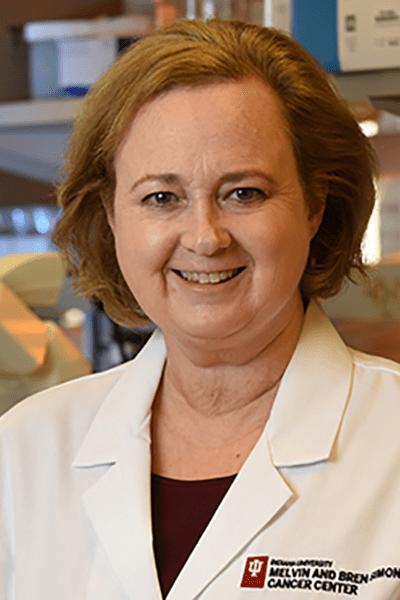
Karen E. Pollok, PhD
Caroline Symmes Professor of Pediatric Cancer Research
Professor of Pediatrics
Adjunct Professor of Medical & Molecular Genetics
Adjunct Professor of Biochemistry, Molecular Biology & Pharmacology
- Phone
- (317) 274-8891
- Address
-
R3 C218E
PHMB
IN
Indianapolis, IN - PubMed:
-

Bio
Dr. Pollok is an Associate Professor of Pediatrics with a secondary appointment in the Department of Pharmacology and Toxicology. She serves as Director of the In Vivo Therapeutics and Angio Biocore Shared Resource Facilities for the Indiana University Simon Cancer Center. She also serves as the Basic Science Leader of the Brain Tumor Working Group and co-Director of the Signature Center for Brain and Neurological Tumors.
Key Publications
-
S. Cai, H. Wang, A.R. Baluyut, A. Ernstberger, B. Juliar, A.L. Sinn, L.D. Mayo, W. S. Goebel, and K.E. Pollok. Humanized bone-marrow xenograft model as a pre-clinical tool to assess therapy-mediated hematotoxicity. 2011. Clinical Cancer Research. 8:2195-2206. PMCID: PMC3078977.
-
H. Wang, S. Cai, A. Ernstberger, B.J. Bailey, M.Z. Wang, W. Cai, W.S. Goebel, M.B. Czader, C. Crean, A. Suvannasankhah, I. Shokolenkoc, G.L. Wilson, A.R. Baluyut, L.D. Mayo, and K.E. Pollok. 2013. Temozolomide-mediated DNA methylation in human myeloid precursor cells: differential involvement of intrinsic and extrinsic apoptotic pathways. 2013. Clinical Cancer Research. 19(10): 2699-2709. PMCID: PMC3711223
-
E. Tonsing-Carter, A.L. Sinn, J. Silver, K.M. Peterson, B.J. Bailey, C.M. Eischen, H. Wang, H.S. Shannon, J. Ding, S. Cai, P.R. Territo, G.E. Sandusky, L.D. Mayo, J. Li, C.B. Marchal, H. Hanenberg, and K.E. Pollok. 2015. Potentiation of carboplatin-mediated DNA damage by the MDM2 modulator Nutlin-3a in a humanized orthotopic breast-to-lung metastatic model. Mol Cancer Ther, 14(12):2850-63. PMCID: PMC4674357 Featured Highlight Article.
-
H. Wang, S. Cai, B.J. Bailey, M.R. Saadatzadeh, E. Tonsing-Carter, J. Ding, T.M. Georgiadis, T.Z. Gunter, E.C. Long, R.E. Minto, K.R. Gordon, S.E. Sen, W. Cai, J.A. Eitel, D.L. Waning, L.R. Bringman, C.D. Wells, M.E. Murray, J. Sarkaria, L.M. Gelbert, D.R. Jones, A. Cohen-Gadol, L.D. Mayo, H.E. Shannon, and K.E. Pollok. 2017. Combination therapy in a xenograft model of glioblastoma: enhancement of the antitumor activity of temozolomide by an Mdm2 Antagonist. J Neurosurgery. 126(2):446-459. doi: 10.3171/2016.1.JNS152513. Epub 2016 May 13; PMID: 27177180.
-
J. Carter, L. Cheng, J. Zucker, M. Marshall, K.E. Pollok, M. Murray, L. Li, and J. Renbarger. 2017. Use of Precision Medicine Molecular Profiling of Baseline Tumor Specimen May Not Benefit Outcomes in Children with Relapsed, Refractory, or Rare Pediatric Sarcomas. Clin Pharmacol Ther 2017 Mar;101(3):328-330. PMID: 28001289.
-
K. Bijangi-Vishehsaraei, M. Reza Saadatzadeh, H. Wang, A. Nguyen, M. M. Kamocka, W. Cai, A.A. Cohen-Gadol, S. L. Halum, J. N. Sarkaria, K. E. Pollok*, and A. R. Safa. (*co-corresponding authors). 2016. Sulforaphane suppresses growth of glioblastoma (GBM) cells, GBM stem cell-like spheroids, and tumor xenografts through multiple cell signaling pathways. 2017. Journal of Neurosurgery, Epub 2017 Jan 6; http://thejns.org/doi/10.3171/2016.8.JNS161197.
Complete List of Published Work in MyBibliography:
| Year | Degree | Institution |
|---|---|---|
| 1997 | Postdoctoral Training | Indiana University School of Medicine |
| 1994 | Postdoctoral Training | Indiana University School of Medicine |
| 1990 | PhD | University of Kentucky |
| 1983 | BS | College of William & Mary |
The molecular characterization of solid tumors such as glioblastoma and relapsed sarcoma has revealed a complex intra-tumoral heterogeneity that adapts quickly to standard-of-care (SOC) by activating “treatment response networks.” Dr. Pollok’s research program focuses on the development of novel multi-phase therapies that target primary and secondary treatment response networks. To evaluate mechanisms of action and efficacy, 3D cultures, patient-derived xenografts, and orthotopic modeling approaches are being utilized. Research areas include:
-
As a pipeline to discovery, use precision genomics and pharmacokinetic-pharmacodynamic approaches to understand adaptive response to treatment and identify biomarkers of response.
-
In adult and pediatric GBM, investigate a multi-phase approach that first targets two interconnected treatment response networks induced by SOC (Mdm2/p53/p73 and PI3K/Akt/mTOR), followed by a second phase of therapy targeting PI3K/Akt/mTOR and MAPK/ERK.
-
Discover novel maintenance and curative therapies for relapsed pediatric neuroblastoma and sarcomas (Ewings, osteosarcoma, and Rhabdomyosarcoma). Targets under investigation are EZH2, Chk1/2, and MYC.
Building upon standard-of-care therapy for glioblastoma and sarcoma by modulation of dysregulated signaling networks.